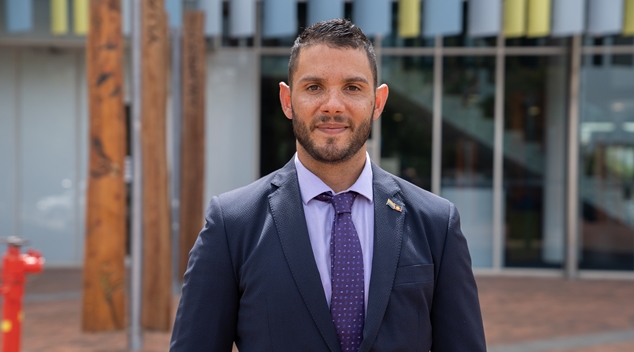OPINION
Professor Braden Hill is Pro Vice Chancellor Equity and Indigenous and Head of Kurongkurl Katitjin at Edith Cowan University. He is a Noongar man and proud member of the LGBTQ+ community in Perth.
A Perth drag queen’s racist past has provoked an important discussion amongst LGBTQ+ communities throughout Australia.
Scarlet Adams, a well-known queen in the Perth scene, has been held to account for well documented acts of racism and marginalising behaviours. While concerns have been raised in the past, particularly from within the Indigenous LGBTQ+ community, the announcement of Scarlet Adams’ involvement in the first ever RuPaul’s Drag Race Down Under has re-ignited and intensified the backlash on a national level.
This most recent reaction has prompted the popular drag queen to apologise, not for the first time, for “hurt caused to marginalised people and communities.”
However, this issue is much bigger than one individual.
As a member of Perth’s Aboriginal LGBTQ+ community and a researcher committed to understanding the lived experiences at these intersections, what has struck me has been the muted and, at times, silencing responses from sections of Perth’s LGBTQ+ community.
Groups with notable public platforms in Perth have expressed that those who feel marginalised by such actions, are allowed to feel hurt. However, this permission to feel hurt seems to be conditional on forgiveness.
This sentiment is one echoed by a number of white Queers who clad themselves with the veneer of ally-ship to Aboriginal and Torres Strait Islander communities while excusing poor behaviour targeting the communities they purport to be allies to.
It is important that we understand that apologies for racism are to be accepted by those for whom racism is an everyday lived reality. This is much in the same way that LGBTQ+ people have every right to be infuriated by non-LGBTQ+ people who invalidate our concern and hurt on matters that affect Queer lives and communities.
My research focusing on the lived experiences of Aboriginal/LGBTQ+ people in Western Australia highlights the sense of exclusion that Blak Queers often feel. For example:
- 41.9% of participants stated that they avoid mentioning that they are Indigenous on dating apps due to concerns about racism or stereotyping.
- Less than half (45.2%) felt a sense of belonging to the wider LGBTQ+ community
- 40% experienced some form of microaggression from non-Indigenous people within the LGBTQ+ community in the last 12 months
These findings are concerning and are reflected in the anger about this latest high-profile instance of racism in the Perth Queer community. They also reflect the critical importance of initiatives like Lulkbudia and Boorloo Justice’s Decolonise Pride, in raising awareness and creating safe spaces for First Nations, Black and other people of colour. These points have also been articulated elsewhere but acknowledging this work is important.
The silence from some key advocacy groups, community groups, venues and spaces does not go unnoticed. However, some in Perth are already listening and acting. Snatch, in response to community concerns, have taken significant steps towards being a safer and more inclusive space for all. We need to see more of this work. Conversely, others have tried to issue statements that have only further demonstrated their ignorance and roundly criticised for their tone-deaf public relations attempts at masking their complicity and unwillingness to challenge racism.
However, the point remains, one cannot ridicule, mock and attack entire communities and think that an apology or multiple apologies (which at the very least should be specific and clear) will suffice.
So, to the Perth LGBTQ+ community, adding the black and brown stripes to the Pride flag is meaningless unless it’s aligned to proactive inclusion. Your acknowledgements of country are tokenistic if you cannot provide spaces for Blak people to fully be themselves. And, your right to call yourself a Queer space will be seriously called into question if you cannot grasp the idea of full inclusion.
Ultimately, the proof is in doing the work and Indigenous/Queer mob don’t want more allies, we need accomplices who actually do things.
But like most times for us blakfullas, it’s our own First Nations communities from which we draw our strength. I recently participated in a workshop with 15 Noongar elders on Queerness and Indigeneity. All of them demonstrated a spirit of openness and inclusion towards LGBTQ+ community members that, at the moment, seems somewhat non-existent in the Perth LGBTQ+ community. I have nothing but the utmost respect and admiration for their love and wisdom.
Ultimately, this is not about attack, blame or one person’s actions, it’s about addressing our past to work respectfully towards a better more inclusive LGBTQ+ community – a community that should be for all of us.

Love OUTinPerth Campaign
Help support the publication of OUTinPerth by contributing to our
GoFundMe campaign.






